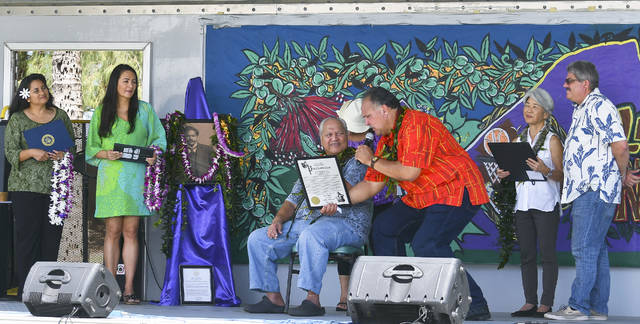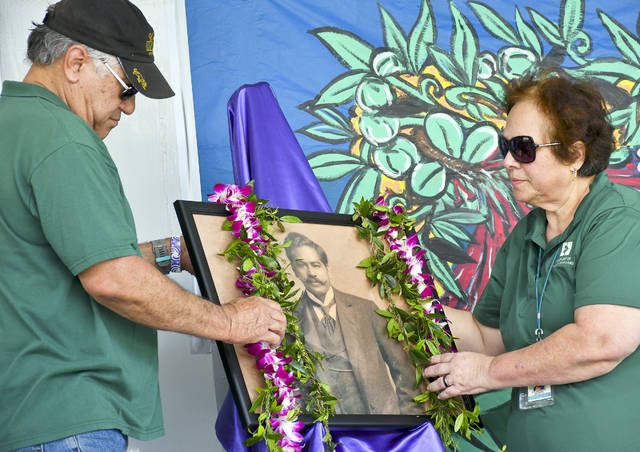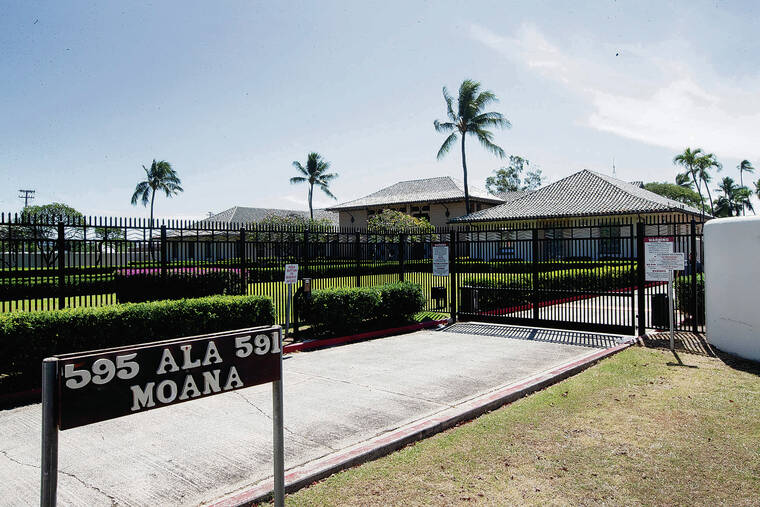Monday, March 26 is Prince Kuhio Day, a state holiday in Hawaii, marked with celebrations and festivities honoring Jonah Kuhio Kalanianaole Pi‘ikoi.
“Without him, I wouldn’t be here,” said Dan Ahuna, the Kauai commissioner to the Office of Hawaiian Affairs, Saturday during the Eighth Annual Prince Kuhio Day Celebration at the Anahola Beach Park presented by Ka Hale Pono. “There would be no Department of Hawaiian Homes Land, there would be no OHA, there wouldn’t be a lot of things.”
During Kuhio’s tenure in Congress from 1902, where he was the first delegate to serve in Congress from Hawaii, Kuhio’s numerous accomplishments include the creation of county governments with elected officials, and the establishment of the Hawaiian Homes Commission which promised native Hawaiians homesteads. He was also the first to introduce a bill requesting Hawaii be admitted to the United States as a state.
This was his dream to save the rapidly declining Hawaiian race from extinction. Following the death of Queen Liliuokalani in 1917, the pure Hawaiian population numbered about 25,000, a decrease from the estimated 300,000 people when Captain James Cook arrived in Hawaii in 1778.
Kuhio’s dream was to return slum and tenement dwellers to the land, encouraging them to be self-sufficient farmers, ranchers, and homesteaders on leased parcels of reserved land.
Following the Anahola festivities, Prince Kuhio celebrations continue on the South shore with the Grand Hyatt Kauai Resort and Spa hosting an opening protocol, Friday morning starting at 9 a.m.
Following the honoring of Kuhio and his legacy, Hawaiian cultural and art practices fill the resort with demonstrations including weaving, kalo, Hawaiian weapons, tapa, and lei making. A silent auction benefiting a local nonprofit will also be available.
Entertainment by Kauai’s kupuna lighten the air throughout the day.
“We honor Kuhio for not only his contributions to Hawaii that include the Anahola Hawaiian Homes, one of the first and largest programs,” said Alroy Enos, selected as an honoree at the Anahola celebration for having characteristics and traits similar to those of Kuhio. “He was born here. He’s a Kauai boy.”
Kuhio was born on March 26, 1871 at Hoai, Kualu in the Koloa District near Poipu. The youngest of three sons of Kauai High Chief David Kahalepouli Pi‘ikoi and Princess Kinoiki Kekaulike, Kuhio’s birthplace is marked by the Prince Kuhio Park, maintained by the Royal Order of Kamehameha I, Chapter No. 3 Kaumuali‘i.
The Royal Order of Kamehameha, a group that Kuhio re-established in 1903, and served as its Alii Aimoku until his death in 1922, will host its commemorative ceremony, Saturday at the Prince Kuhio Park starting at 10 a.m. with ho‘okupu offering by the various Hawaiian organizations and civic clubs.
Kuhio helped form the first Hawaiian civic club in 1918 in an effort to perpetuate and rehabilitate the Hawaiian people and their culture. This movement has grown to include 49 distinct organizations across Hawaii and the mainland.
More celebrations take place, Sunday at the Grand Hyatt Kauai when the Tsunami Taiko awakens the day starting at 10 a.m. and heralds the opening of a craft fair which continues at the resort through 3 p.m.
Monday, the Prince’s actual birthdate, will see the Marriott’s Waiohai Beach Club hosting its annual Prince Kuhio observance in the lobby, starting at 10 a.m.
••• Dennis Fujimoto, staff writer and photographer, can be reached at 245-0453 or dfujimoto@thegardenisland.com.







An error needs to be corrected: Article says “…Kuhio’s tenure in Congress from 1902, where he was the first delegate to serve in Congress from Hawaii.” But Kuhio was actually Hawaii’s second territorial delegate to Congress, not the first. The first one was Robert Wilcox. I hope this correction will be made in the print edition, not merely as an online comment.
Aside from correcting the error, here is some additional information about Mr. Kuhio which would be of interest to readers who want to look more deeply into Hawaii’s history.
Some ethnic Hawaiians revere Kuhio as a prince for the same reasons the peasantry in any monarchial nation reveres its royalty — majesty, mystery, pride in the nobility of a great leader, and hope for handouts to help the poor and downtrodden. Wealthy racial separatist Hawaiian government institutions honor Kuhio as their founding father, the man who bowed low enough to the colonizers to bring home the bacon from their far-away seat of power.
But was Kuhio’s personal behavior princely? At least two major events in Kuhio’s life after the revolution of 1893 should cause Hawaiian sovereignty activists to question his worthiness as their torch-bearer. On these two occasions Kuhio was grossly unpatriotic to his Hawaiian “nation.” The first occasion was when he abandoned his nation at its time of greatest peril in order to pursue personal pleasure and foreign adventure. The second occasion was two decades later when he abused his power and prestige to launch a personal attack against Queen Liliuokalani in order to steal her land, for his personal enrichment, from the children she intended to help. Kuhio’s behavior on both occasions should be viewed as not merely selfish, but treasonous from the viewpoint of the sovereignty activists.
In January 1895, at age 23, Kuhio participated in the attempted counterrevolution against the Republic of Hawaii led by Robert Wilcox. He was sentenced to a year in prison, where his fiancee visited him regularly. After his release they got married and went to Europe. It’s understandable that the heir to the throne would feel unhappy about imprisonment and about the loss of his future crown. Certainly nobody would begrudge him the right to get married, and perhaps to travel for a while.
But Kuhio’s extended absence is inexcusable in view of the major political events taking place in Hawaii. He played no part in fighting against annexation, even while his fellow “patriots” were making speeches, writing articles in the newspapers, and gathering 21,000 signatures on a petition in 1897 opposing annexation. Today’s sovereignty activists excuse his non-participation by claiming he was “in exile.” But nobody forced him to leave.
Kuhio extended his European adventure by going to Africa where he spent three years fighting on the side of England in the second Boer War. Let’s put that in different terms so that today’s sovereignty activists will get the point. Kuhio, designated heir to the throne, abandoned his native land during a time of great political upheaval and went to war halfway around the world, fighting on the side of one white colonial power against another white colonial power in a war to see which one would win control over the land of a poor, downtrodden dark-skinned native population. Kuhio returned to Hawaii in time to join the Republican Party and defeat the incumbent Robert Wilcox in the 1902 election for Territorial Delegate to Congress, whereupon he took the oath of office swearing to support and defend the Constitution of the United States against all enemies foreign and domestic (Traitor to the Hawaiian nation!). He introduced the first bill in Congress for statehood for Hawaii (Traitor to the Hawaiian nation!). He finally “brought home the bacon” after 19 years in Congress with passage of his Hawaiian Homes Commission Act (Sellout!).
The case of Kuhio vs. Liliuokalani in 1915-1916 is perhaps even more troubling. The “prince,” now Hawaii’s Territorial Delegate to Congress for 13 years, abused his power and prestige to launch a personal attack against Queen Liliuokalani in order to steal her land from the children she intended to help. Kuhio publicly accused her of mental incompetence in order to nullify her creation of the Queen Liliuokalani Childrens’ Trust, and to establish himself as conservator of her estate, so that after her death her Waikiki properties would go to him instead of to the benefit of the Hawaiian children. Luckily for the children, his lawsuit failed. Full text of the Hawaii Supreme Court decision, including details about what Kuhio was trying to do, is on a webpage: JONAH KUHIO KALANIANAOLE v. LILIUOKALANI, Supreme Court of Hawaii, 23 Haw. 457; 1916. Syllabus and full text of the Court’s decision.
http://tinyurl.com/ce7avc
Evelyn Cook’s book “100 years of Healing” includes extensive description of the lawsuit, and especially the role of attorney W.O. Smith in defending Liliuokalani. Knowledgeable readers might be surprised, because W.O. Smith was one of the leaders of the revolution of 1893 that overthrew Liliuokalani. But as time went by the ex-queen realized that Smith was completely trustworthy whereas Kuhio was arrogant, selfish, greedy, and profoundly disrespectful to the woman most ethnic Hawaiians still regarded as their Queen. She appointed Smith as trustee.
The year was 1887, bayonet constitution. Letting people know the USA military ruled the Hawaiian waters. Jones Act came about because of industry leaders that look out for their own wealth. Manufacturing of warships was a big industry back then. New England states. That was the way they traveled then. The Yokohamas so they were called. From many countries they came and dined at our still luxuries Kaanapali lookout, home of the world famous other sites in Hawai’i. Waikiki
Wrong job. ???
Survey, answers, then solutions. For the community.